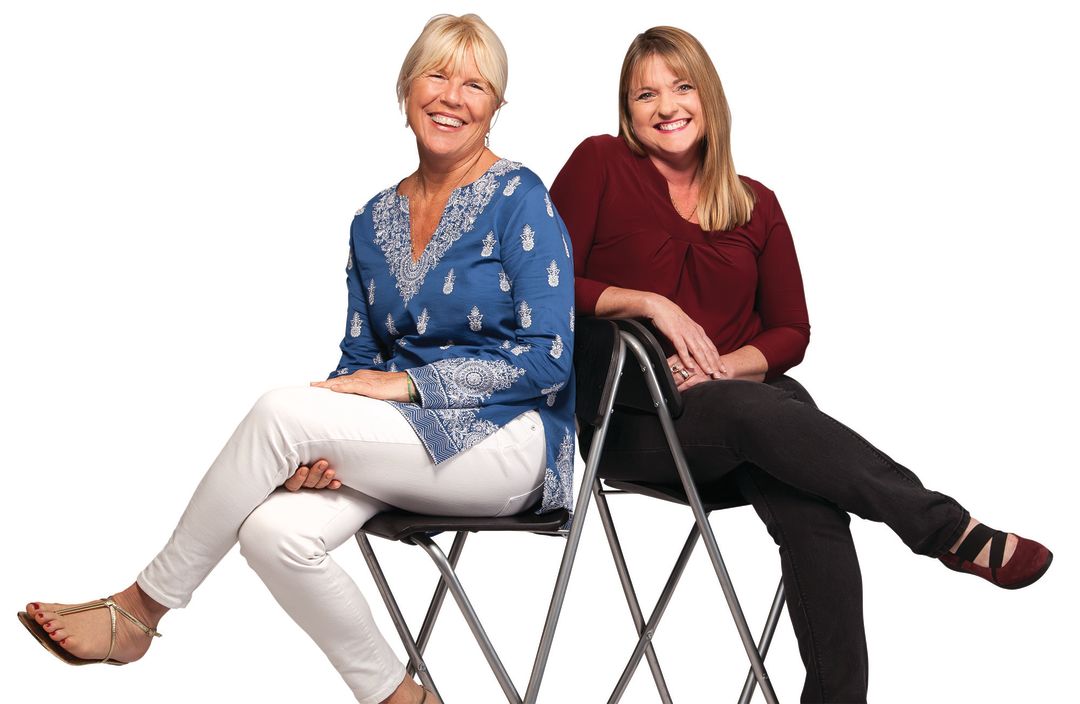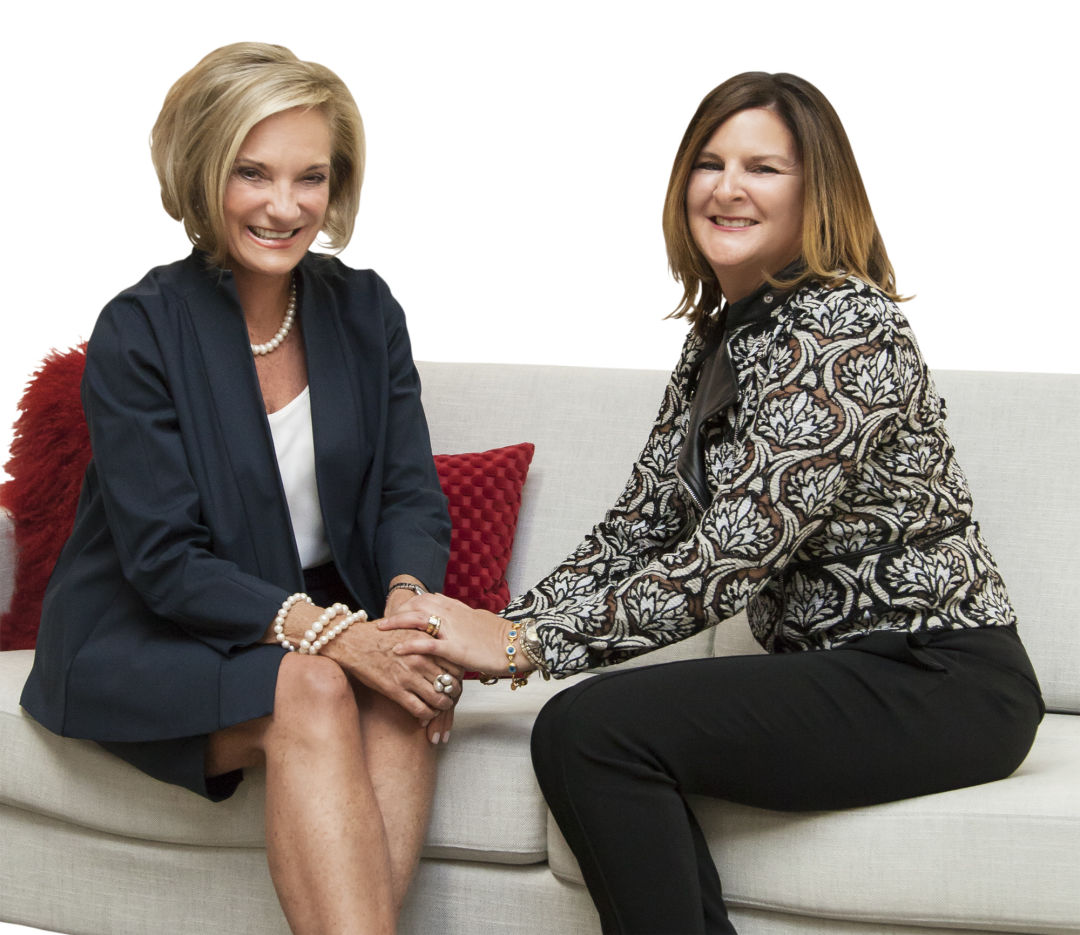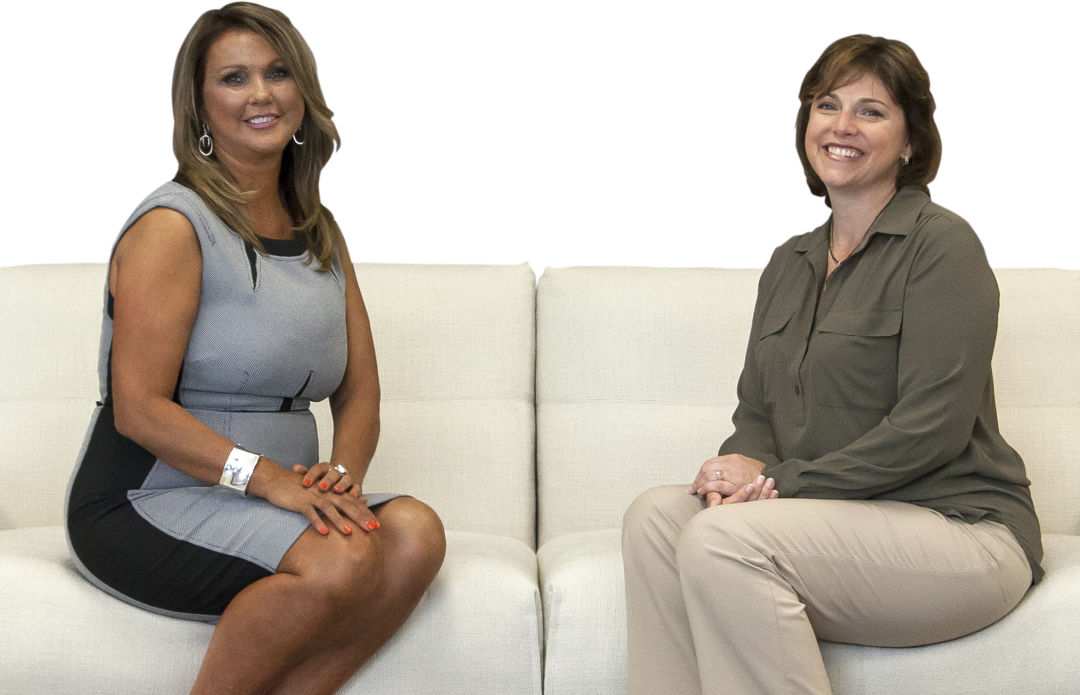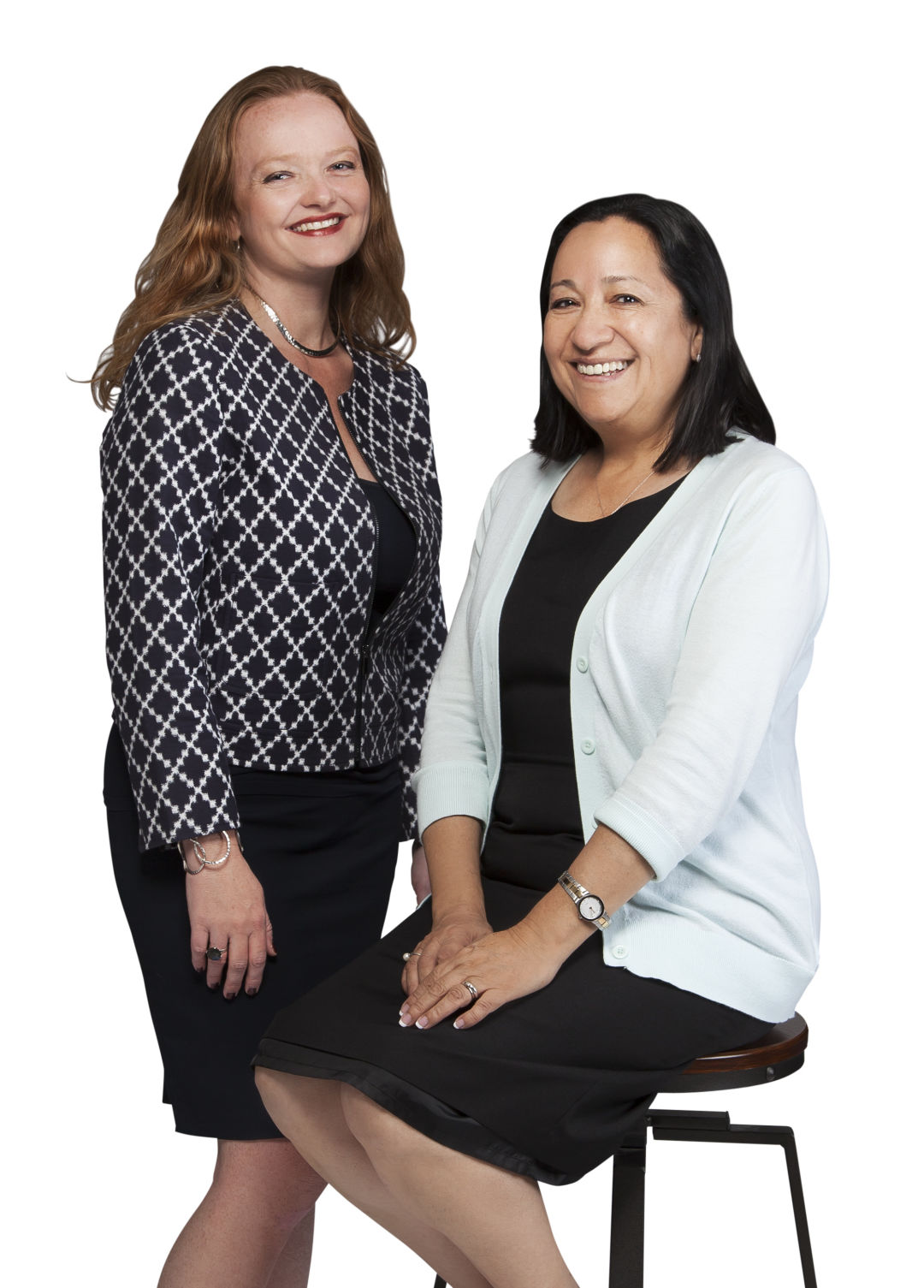What Do Working Women Really Want?
We invited eight high achievers who’ve made headlines this year to pair up with each other and talk about what drives them, challenges them and matters most.

Sigrid Olsen & Karen Bell
|
Artist Sigrid Olsen, 62, started out in the ’70s hand-printing fabric with colorful designs and selling it at craft fairs. She went on to become creative director of her own sportswear line for Liz Claiborne, Inc., but in 2008 was laid off in a major downsizing. She regrouped and re-emerged in Sarasota, running a small art/yoga retreat/design business. In 2015, she launched a new fashion collection with HSN. Third-generation fish broker Karen Bell, 52, entered the family business in the 1980s, eventually assuming ownership of A.J. Bell Fish Company and then diversifying into a restaurant and retail market after buying the next-door Star Fish Company in 1996. In 2012, Travel & Leisure magazine put Star Fish Company on a short list (31) of the country’s top seafood restaurants, and last year celebrity chef Emeril Lagasse stopped by with his Cooking Channel TV crew. Olsen: I didn’t study fashion design. I thought if I did prints on fabric, it would be for home furnishings. You know how life is. It goes in a direction, and 30 years later, your head pops up: “Oh, I guess I’m a fashion designer.” Did you know what you were getting into? Bell: I was working at IBM in college, interning in marketing. Although IBM was phenomenal to work for, it was so regimented. It was a suit every day, and someone constantly telling you what to do. I said, “Dad, I want to come home and work in the company business.” And he said, “It’s a man’s world, and the regulatory issues are getting worse and worse.” Of course, dealing with these fishermen—you almost have to be a psychiatrist to do it. I don’t think he wanted his children to have that tough kind of life. But I came home, and I love it. Olsen: It fits you. I went through some of those same cycles, but it was different because I was a designer, so I got to be a little more offbeat and creative. But there were still stringent ways that corporations have to do things. Now I’m just back to me and two female partners. I never thought that I could live where I wanted to and have a business. Bell: You can. Seafood is a man’s industry, but being a woman for me has been an advantage. Once my uncle came in all mad because he had told the fishermen to stop drinking. He came and got me. I was maybe 30. I said, “Either this is going to stop, or I’m going to call the police.” They stopped. And it drove my uncle crazy because they listened to me. Our dock is one of the most family-oriented, professionally run. In so many of the ports, from Galveston down to the Keys, there’s so much drug abuse. I’m not saying we don’t have any issues—there are bad boys at times—but all in all, they toe the line. They know I’m hardcore. If they break a federal law, they are out the door. I’ve had grown men cry, which is grueling. Olsen: You sound pretty badass! Bell: But I’m not. I rarely raise my voice. Olsen: I just believe if you’re a hard worker and honest and focused and kind—all the good stuff it means to be human—it does pay off. I think sometimes women go in with this feeling that they’re going to be discriminated against, and I just did not feel that way. Bell: When I got out of school, my dad gave me guiding principles. Keep your word. Pay the fishermen a good price. Give them good weights. Pay for your fish before you pay for anything else. Just common sense. It’s shocking when I look around at people in the industry—many of whom have left it or are out of business—and they don’t do that. Treat people how you want them to treat you. Olsen: Then your interactions are pleasant. People smile, and they thank you, and you thank them. Bell: How people deal with adversity—that’s a real indicator of how successful someone tends to be. I’ve seen people where boats have sunk, they’ve lost crew members, and they pick themselves up. When I was in my 20s, we sent a container product to Taiwan, and it was stolen. $100,000. We couldn’t pay our credit line off, and the bank was mad. It ate at me. Then one day I was driving, and I got T-boned. It made me think, “What does this really matter?” A week after that, the insurance paid. I had made myself sick for months over something—not that it didn’t matter, but it wasn’t something to work yourself up over. Olsen: People have said to me, “You’re amazing, the obstacles that you’ve overcome—breast cancer, your husband dying, your business closing.” But what other choice do you have? You have to just move on. Life is such a gift. Bell: See, that’s the personality that I think makes you successful. Somebody told me: “Don’t worry about the competition. Focus on your business.” I live and breathe the business. But it’s fun. I don’t consider it work. Olsen: I have a three-step process. One is to set an intention, just have a vision. The second is do the work. Every day get up and work toward your goal. And have faith. Because sometimes you’re working your ass off, and you see no result. But once all that comes together—the vision, your work, and your faith in it—then I feel I’m doing everything to create a life that’s compatible with my most authentic self. Then I’m like you: It’s not work. |

Barbara Zdravecky & Dr. Karen Hamad
|
Dr. Karen Hamad, 47, was named chief of staff of Sarasota Memorial Hospital last year, only the fourth female to be named to this position in the hospital’s 96-year history. She is certified in internal medicine and pediatrics and practices with First Physicians Group. Barbara Zdravecky, 64, is CEO of Planned Parenthood of Southwest and Central Florida, an affiliate that expanded last year to cover 22 counties and serve 39,000 patients. She’s been a vocal advocate for women’s reproductive rights and her organization in a year that has seen myriad state and national challenges. Hamad: My family was Arab-American, and my life was like My Big Fat Egyptian Wedding. I was expected to be home with my parents. I was shy and wore big glasses. But I always wanted to be a doctor. I was a world literature major at Middlebury College as well as pre-med. I chose world lit because being a doctor is about taking care of people. We all learn the science, but the microscope won’t tell me what’s wrong with you. Ninety percent of all diagnoses are made with history and a physical. All you have to do is listen. Women are inherently better at [relationships]. I don’t think it always occurs to men how their choices affect society. Zdravecky: You’ve developed those skills of empathy. I never thought I’d be a CEO. I had a bachelor’s in social work and was thinking about going into a master’s program, and one of my mentors said, “Go into nursing, it has so many more opportunities.” I was invited to be head nurse of psychiatry at Manatee Hospital and then I was recruited by Planned Parenthood as CEO 22 years ago. Looking back, I see a path of leadership I wasn’t aware of [then]. I always wanted to help the underdog, the mentally ill, women who were downtrodden, vulnerable children. Hamad: I’m five months and 15 days into being chief of staff. I can feel myself having gotten stronger, [but] I still find myself thinking when I get a call from someone in power over me, “Oh, God, did I do something wrong?” I had a big obligation to show the medical staff I was not just a “yes” woman. I’ve had to have serious conversations. Having some doctors come back to me and say, “Your voice changed the hospital’s mind”—that’s given me confidence. Zdravecky: I’ve gotten over a lot of my fears. I guess what scares me the most is someone getting hurt on my watch, like what happened in Colorado last year. We have people who threaten to kill me, to hurt my staff, who stand outside our fences every day and hurl insults. Hamad: It used to be easier to be a doctor. With social media and cellphones, you would not believe the texts and Facebook messages I get, even at 11 p.m. When I’m not on call I put my phone in another room. Zdravecky: I’m trying to eliminate that, too. Our work is exhausting. I need to have quality sleep and that’s one of the gifts I can give myself. I still have a landline. I put my phone in the other room. Hamad: As soon as someone calls me, I feel guilty. What if something should happen and I’m being selfish? Zdravecky: I have a private trainer, a massage therapist, a chiropractor, an acupuncturist and a psychiatrist who help me get through my life. Two weeks ago I rented a cabin on the Suwannee River, and I went by myself. I hiked and watched the spring come to North Florida. I was in my soft clothes, didn’t have to talk to anyone. Nature is my big healer. Hamad: I try to make dinner three days a week. I go to the ocean if it’s been a bad day. I exercise. I get my hair done every three weeks. I get my nails done every week. I get a massage when I can. My mom taught me that if you look good you feel better. Zdravecky: You know what really annoys me? Men don’t have to do that. The money we have to spend so we can look a certain way so we are appealing in our jobs. It’s unfair. Hamad: When I walk into a meeting, you know how many men comment on what I look like? Almost all of them. Women’s opportunities have changed, though. When I was applying for jobs here, there were five male doctors. I felt obligated—they did not make me feel this way—to let them know I would complete my childbearing before I joined their practice in a year and a half. Society had made me feel that if I was going to be a successful doctor I had to be a successful male doctor. Damn if I didn’t do it. I had my two kids, maternity leave was over, and I came back to work. Never missed a day. We hired a female doctor last July. She has a 1-year-old and now she’s pregnant again. We’re all fine with that. I didn’t think I could do that 15 years ago. Zdravecky: Women look out for one another, especially because we are healers. I bought a car a couple of weeks ago. I’m in the finance office, this beautiful young woman, who is the finance officer, draws me aside and said thank you for your service. This happens to me five times a week. I get tearful. I’ve been so blessed to lead this charge. Hamad: When you walk through your gates every day, stand up and show your staff and patients that you are there for them, you make everyone around you brave. Zdravecky: I just turned 64 this week. To watch a younger professional and your commitment to doing the right thing makes me so grateful to have someone to pass the torch to.  Gail Bowden & Anne RossGail Bowden of SVN’s Commercial Advisory Group of Sarasota and Bradenton was named the No. 1 SVN commercial real estate broker in Florida in 2016 and ranked No. 3 in the world. With more than $50 million in 2015 sales, she specializes in medical and industrial property sales. Last fall, engineer and former Longboat Key Town Manager Anne Ross, 43, was named executive director of the Lakewood Ranch Inter-district Authority, where she manages the day-to-day government operations and four district homeowner associations of one of the 10 best-selling communities in the country. Bowden: I grew up in Vernal, Utah, a very small town drenched in oil and gas, one of seven kids. I’m the baby. I started my career in the oil and gas industry as a facilities VP and did real estate for them as well, so I traveled all over the western U.S. It was a male-oriented industry. Ross: Seven kids? I’m one of four girls. I have a sister who’s a doctor, one who’s a teacher and another who’s an actor. My parents told us we could be whatever we wanted to be. By training I’m an engineer. I started in consulting engineering and then moved into local government. Some of my skillset is probably more female, getting collaboration, managing projects and keeping track of multiple things and finding compromises. Bowden: As females we do better at managing the emotions, the project from start to finish, and bringing knowledge to everyone. I have strong parents and family, too. They said, “Go out and do what you want to do.” So I had a goal six years ago when SVN took over the franchise in Sarasota. I wanted to rise to the top, not only locally, but nationally. I made my goal. Ross: I also had mentors who really pushed me, both male and female. You can’t do it all yourself. Bowden: I agree. There’s always somebody, in any stage of your life and work. When we go back five years ago, Jerry Anderson, who was over SVN in the state of Florida, came into my office and said, “Bowden, I want you to be No. 1 in Florida.” Ross: Competition is a little different for me. It’s not beating someone at a sale, but finding the compromise or a unique solution to problems. That gives me my thrill. Bowden: Competition is my drug. I tell everybody, “Bring it on.” Ross: Before the downturn, the engineering firm I worked for here in Sarasota closed, and I was eight months pregnant. I thought, “Now what am I going to do?” Luckily I found the job over on Longboat Key. For me, there are 10 ways to skin a cat. If I have to flip burgers at McDonalds, I’ll make it work. Bowden: That’s what I always say, too. The downturn in real estate was tough. People were afraid to invest. But I give myself 24 hours to feel bad and that’s it. I always have a goal. People always say, “In the box, out of the box.” I don’t have a box. Ross: That’s great. My goal is to look at the community out east and try to help everyone figure out how they’re going to grow and keep the nice community that they came for. Bowden: I’m interested in empowering women, and I’m trying to learn about the millennials—what they want and how that affects my business. People say, “Oh, those millennials. They’re a pain.” But our company is really involved in the younger generation coming up. We know millennials are technology oriented. They are perfectly happy with a text. I flew out to California to meet a REIT. The [principals] are my daughter’s age. What was shocking was they said, “You are the first person who has ever made an effort to meet us in person.” Ross: The world is changing. I’m the breadwinner. My husband has his own business and he’s more flexible. So when I’m at evening meetings he’ll take over the kids, and the kids aren’t losing out. Bowden: I came from a world that was men in upper management. I focused on being who I wanted to be—of course I wanted to be paid for it—and to succeed. There’s a book, Feel the Fear and Do It Anyway. People would be surprised, but I’m an introvert. When I’d go places, I’d be so scared. I thought I was the only person in the room that was so frightened. I read this book and it said everybody in the room is frightened. That fear pushes you. Ross: Mine is getting up in front of a board and not knowing the answer. I’ve done all this work and they’re going to ask me something I don’t know and I’m going to look stupid. I push through it. Nobody can know all the answers. That goes back to the team effort. Your team can help. Bowden: Probably the biggest thing is to empower other women. We focus on our own journey and moving to the top. Let’s go to the top together and become a cohesive team. Ross: Nobody’s perfect in everything. Don’t be afraid to match up.  Susie Bowie & Luz Corcuera
Bowie: What I love most about Luz is that she uses all of her gifts and talents from the heart. She’s very passionate about that. That motivates me when I find that in a donor or someone who is working for a nonprofit. Both you and I have taken risks right now by accepting these new positions. Corcuera: Giving up my benefits. Bowie: But neither one of us could say no, because we felt that without question it was the right thing for us to do. Corcuera: The timing called. Bowie: Women leaders need to recognize what their gifts are, and then they need to rise up and say, “What’s the most I can do with my gift?” Many times it’s taking that leadership role, or making ourselves a little vulnerable so we can get the experience that we need to become leaders. We need to encourage some measured risk-taking. Corcuera: I don’t have fears. My mother was a very strong role model. She was not afraid to say what she felt. And she was not afraid to do and to serve. We have an obligation to serve the people. It’s not what I think. It’s important what they need, what they want, what they are willing to give as well. Bowie: I want to honor history and find creative and new ways to take our organization into the future. Which means not disappointing people. That’s probably my biggest fear: disappointing people. As a woman that can be a very difficult thing to get over because I want people to be happy and pleased, not just with our work but with our organization. And as I’ve learned in philanthropy, you can’t please everyone. It’s less about pleasing people and more about making an impact. You make an impact by including everyone in the conversation. Corcuera: I always had, luckily, the ability to find a safe place within. Even if it’s the most stressful job, the most stressful time—and being the mother of two children, being an immigrant woman to begin with. When my husband and I decided to emigrate to Canada, we didn’t know anybody. I thought I spoke English, but I had to take classes. But that helped me become stronger, helped me find that place that I needed to go in frequently so I could re-energize myself, refocus. Bowie: I have to have my time outside. I get centered when I’m out in nature. I love to pull my kayak out. I feel so fortunate that Manatee County has these wonderful preserves where you can be in nature and just be. Corcuera: If we are thinking about transforming the life of the community, we must be transforming our own lives. And transformational leadership means being first, before doing. Bowie: My parents have always modeled conviction and building self-esteem in others. And kindness. You can’t be successful unless you’re kind to others. I think sometimes women go in the opposite direction because they fear that their kindness will make them appear soft. Corcuera: I try to be in the moment, be in the here and now. It’s extremely important that we don’t allow ourselves to think about the next meeting that we have to run, the next thing that we have to do. Because, one, you don’t enjoy, and second, you can lose focus. Bowie: We have a huge opportunity in both our communities with millennials. We hear a lot with millennials either getting frustrated with the housing situation or not being able to find a voice within their organizations. Millennials may not have the money right now to open up big funds, but these are activists. We want to harvest that. Corcuera: We should not let go of that talent. In my previous two jobs, I hired young people. Every time we went to give a presentation, people asked me, “It seems like you have the youngest team.” And I do. I like to work with young people. I am sad when some of them say they don’t want to stay here, in Florida, including my own children. Bowie: Your point about encouraging young leaders to come forward is important. My counterpoint is, we need to encourage other people to give them a chance. Corcuera: Absolutely. I would love to see in the next 20 years younger senators, representatives, commissioners, presidents. It’s the time for them to shine. So if you decide to enter into the political arena and run for office, I will volunteer to manage your campaign! |



